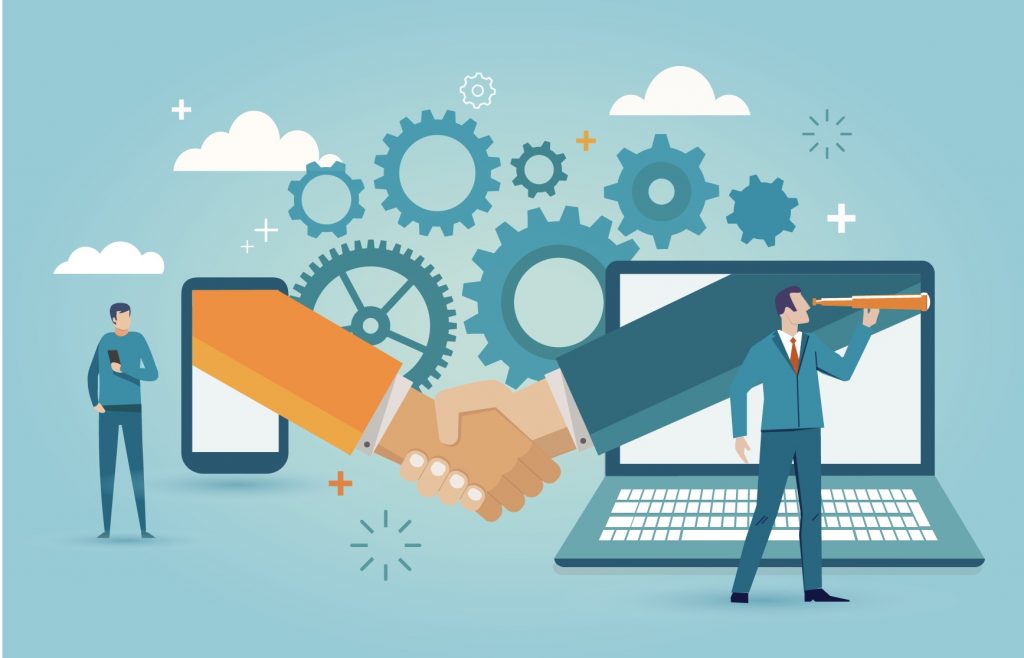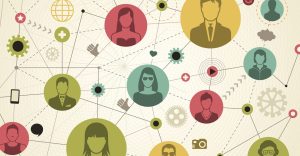
“Big brother is watching you”, the famous phrase from the book 1984, written by George Orwell, that refers to the constant surveillance by the government, is as relevant as it has ever been. In recent times, it has been accepted by the mainstream to let Big Tech companies such as Facebook and Google collect personal data from us on a massive scale. This is in a sense no different from this doom-scenario sketched by George Orwell. Shouldn’t we be massively protesting against just the idea of this violation of our privacy?
The recent Cambridge Analytica scandal did shine a light on this occurrence. Because of this, a great number of people have become more aware of the impact that mass-scale data collection has on society. Our choices are greatly impacted by these companies that own our data. To this day, people still get manipulated on a large scale, because they massively give their data away for free. Companies like Facebook and Google probably know you better than your mother and siblings do. Data is the new oil of this day and age. If data is so valuable, why are people seemingly giving it away for free, even though one could argue that personal data rightfully belongs to people themselves? We could push this notion even further and claim that owning our data should be seen as a human right. Shouldn’t there be laws set in place to prevent this data from being used unrightfully by big companies? We think that people should own their own data, not by Tech Giants.
Data as a human right
The musician Will.i.am proposed that, like access to water, personal data ought to be a human right. Musicians like him generate a lot of wealth through the music they make. Music in a sense is some form of data that through copyright is treated as some form of property. Why should there be a difference between music and personal data, if both contain some kind of value? Before asking this question, we should ask ourselves first the following: what value does my data hold? Music is a form of entertainment which brings joy to many people. It is easy to see the value of this data. However, what value brings personal data? The answer is actually very clear: on a large scale, it creates a lot of value. Companies are monetizing our data like crazy with targeted advertising and using it for predicting our voting behavior. The 2020 Democratic Presidential candidate Andrew Yang proposes that, in order to regulate the tech industry, data should be seen as some kind of property. In a report he referred to, it is stated that companies generate a total of $198 billion by 2022.
Profit of companies from personal data
Data has become an important part of the resources of a company. Currently, some of the biggest and most valuable companies of the world (e.g Amazon, Google), collect large amounts of data to analyze it and process it. These businesses use the data they obtain from us in multiple ways, benefitting from our interaction with the internet.
Analyzing the data allows them to get a better understanding of our preferences, making it possible to think of new ideas for products that are very likely that a certain population will like. Another reason for these companies to store our data is the possibility to make customized advertising. It allows the tailoring of the promotion of the products based on the needs or preferences of the clients. Making it possible to maximize the sales in different ways, such as suggesting similar products to the ones that have been purchased before. It was estimated that the Media Advertisement Market had a revenue of US$155 billion in 2021.
Everyday, the services provided by different companies generate tons of data from the interaction with the people. For example, it is estimated that Facebook generates around 4 petabytes of data daily, making it the most data-generating social media platform there is. The amount of revenue that they generate per person has grown significantly over the year, which indicates that data is very valuable. What adds most of the value to these companies is the exclusivity and large amount of information that they possess, which allow them to manipulate it and sell it without needing the permission of the users. We could make a question at this point, if only a few people are making money for owning our data, shouldn’t they pay us for the right to use it ? At first it might seem that owning our data would be irrelevant and it would not make a difference for these companies. On a big scale, these companies are taking advantage of people, without us doing anything about it. Meaning that we could also take advantage of all of this revenue since we are making it possible for this profit to exist.
It can also be argued that the companies are the ones that are monetizing the data through different methods, which represents a lot of work and dedication on their part. Some of these companies have managed to make our data actually valuable, meaning that all the merit has to go for them, otherwise if they had not managed to give data an important use, it would be mostly worthless.
Terms and conditions
Currently, it is very common when we sign up to a new service and we do not even look at the Terms and conditions that we are agreeing to. Usually these are stated in a very long document that are hard to sift through unless you’re a judicial expert, which leads to accepting them blindly in order to have access to the service. The outcome of this situation is millions of people accepting that their data will be stored and commercialized without the need of asking for consent or even informing them about any operation. People are not aware what value they are giving when they are giving informed consent.
On the other hand, there are not any regulations against the companies doing this. It is the complete responsibility of every user to know under what terms a service is being provided, and assume the consequences that these might have. As long as companies are allowed to collect data and commercialize it, it is likely that this situation will keep occuring throughout the time.
As a consequence, we are facing a serious privacy problem. Third party entities that are unknown to us could have our data and be able to analyze our habits and preferences.
Currently, there are not many regulations for companies on how to handle our data. Fortunately, in the past few years, governments and people have become aware of the value that personal data has, and the implications of its use. In 2018, the European Union approved the General Data Protection Regulation (GDPR), which enforces laws to any entity that collects data from users. For example,it states that companies must inform the purpose of the collection of the data. These events bring a little hope to society regarding this problem, which means that we will have a better insight about who has access to our information. If we want to keep the notion intact that we own our data, we should be able to know who has access to it and what they do with it.
Laws and Regulations
Currently, there are not any laws that allow the user to own their data. Governments have debated multiple times about whether it should be allowed for a user to own all the rights to certain data. The Dutch Law states that ownership is the most comprehensive right a person can have on a thing. In this context, ‘things’ are defined as tangible objects that can be manipulated, like a house or a car.
Establishing laws for data ownership is a difficult task. One reason is that the ownership of the data cannot be unlimited, for example, a governmental entity must verify that your name is spelled correctly in order to be able to provide a citizen card. This makes it more difficult to find a transparent way where people can access their data.
The focus has been on the access to the data instead of ownership, which makes the objective easier to reach. The GDPR introduced multiple laws regarding the regulation of the data. For example, a person can ask a company to provide them with the data the company has collected about them, and ask for the correction of this if necessary. It shows that some improvements have been made in this aspect, but there is still a long way until people can actually have more control over their data. Furthermore, introducing this type of legislation can have a big impact on the economy as it influences the way of how companies are used to work. After the introduction of the GDPR, multiple institutions have had difficulties implementing the changes that these laws enforce. As a result, it can be inferred that besides introducing regulations, it is also necessary to offer support to the changes, reducing the negative impact they might provoke.
Owning your own data: reasonable?
One could argue that the notion of owning your data is silly: how do you assert the exclusive right for someone to use a certain piece of data? Data in itself is meaningless. It needs context for it to hold value. In an interview with the Guardian, Shoshana Zuboff, writer of the best-seller book The Age of Surveillance Capitalism, gives her opinion regarding this topic. She states that the idea of data ownership is something that is misleading and takes away from the problem that we should actually focus on: the fact that data ownership should exist to begin with. She states that surveillance capitalists, companies that generate revenue through personal data – not only make money off the content that you write, but of more nuanced features which at first glance doesn’t seem like personal data, like grammar and punctuation usage. This data can be used to produce more relevant data, like your education level.
When looking at the different kinds of data, this data could be categorized as derivative data. Tech giants claim to own data like this. This data is used to create a predictive profile of a user. It is hard to defend the notion that the user is the rightful owner of this data. Nonetheless, even though not all of the data that companies use to generate revenue can be defined as personal data, data ownership still has its use. Perhaps the derivative data will eventually be deemed to be personal data after all.
The right approach: Focus on Access, not ownership
Currently, data ownership does not have a judicial basis to stand on. In fact, individual data ownership rights are not yet recognized by any jurisdiction. The reason for that is because there is no judicial principle that would justify the allocation of exclusive property rights over data. Instead, we should focus on access to data. Right now, users do not have access to the data companies collect about them. A solution to this would be to propose a user-centric data model.
An example of a user-centric data model would be a personal data cloud. In order to make the claim of data ownership feasible, users should have a personal data cloud to which they can add their own data and access the data that third party companies collected about them. This way, it would be possible to guarantee transparency to the user. According to the European law on privacy, the GDPR, companies are required to provide the data they collect off users when asked. In a sense, this user-centric data model changes this into a mandatory duty. The transparency of this model makes it possible for users to choose what to do with their data.
Data ownership is becoming more relevant every day, as people are more aware and interested in the topic. Not many regulations have been imposed until the day, allowing companies to have freedom about how to handle our data. This is certainly changing as we can see a slow progress where solutions are debated. Personally, We think that data should be considered a human right, and that we should be its owners, deciding who to share it with. Beside the potential economic profit that this may bring us, it would bring multiple benefits as we would have more privacy if we desire to. This change might still take a couple of years, as technology develops fast but bureaucracy is slow. As far back as 1996, expert Kenneth C. Laudon already proposed a system of individual entitlements to data.
Another possible concept that could be applied to data ownership is “public trust”. Just like a park in the city, which belongs to the public at large, all the data within a certain region could be seen as belonging to its citizens. A city might then be declared the trustee of that data and guarantee proper usage of that data. A company that uses visual data – For example for autonomous cars – might be prohibited from the data further as training data. Commercial usage of personal data could also be conditioned to agree with sharing a fraction of the profits with the public. In this manner, individuals will make a profit on their data sharing.
It is still not clear what might be an optimal solution for the collection of data. Multiple technologies are being discussed, but what is the best one to pick is still a question. The proposed user-centric data model is a candidate for having a better control of the data. However, more aspects need to be discussed, for example, who would be the owner of the cloud where the information is stored? Also, should the rights be shared with this entity? These are questions that still need to be discussed in order to come up with a solution that satisfies both sides. Either way, We think that the focus should be on protecting the rights of the user. Tech companies are becoming more powerful through using our data and changing the narrative to be more user-based might stimulate governments to implement laws that protect the user as such from tech monopolies as they go haywire with our data.

